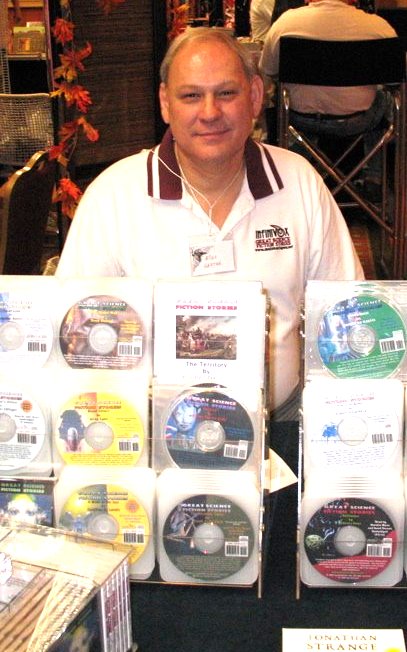|
AUDIOBOOKS: PART 2 Why Would An Audiobook Producer Cast You? Three More Reveal What They Seek In Narrators May 20, 2016  By Tom Dheere By Tom DheereVoice Actor, Audiobook Narrator & Coach See Part 1 As an audiobook narrator, take a break for a few moments and imagine yourself switching seats with a producer - with someone who is seeking a narrator for their next book (perhaps a role you'd savor!). In the producer's seat, what would you be looking for in that narrator? In Part 1 of this series, three audiobook publishers/producers answered that question and more for us (Debra Deyan, Deyan Audio; Aaron Blank, Random House; and Jackie Rosenfeld, Bee Audio). Today, three more experts share their advice:
Arnie Cardillo, Live Oak Media  Q: What qualities do you look for in a narrator when casting an audiobook? Q: What qualities do you look for in a narrator when casting an audiobook?It depends, of course, on the book and what is required to make the story and characters become real and believable to the listener. I produce audio recordings of children's books, primarily, and you can have some rather interesting (and outlandish) characters presented in the stories. They could be children, adults, animals, talking cars and trucks, otherworldly creatures - you name it, and sometimes all in one book! So the narrator has to be versatile and creative in his or her approach to the story and characters. But each book requires a different set of narration skills. Q: What qualities do you look for in a narrator during the recording session that would make you want to cast them again? A narrator who leaves his or her ego at the door, i.e, someone who is willing to cooperate with the director and everyone involved in the production, and someone who will do what is necessary to produce a quality recording. Also, a narrator whose skill set allows him or her to deliver a very special performance. Patience, politeness, and perseverance are always qualities that are essential to the mix as well, and are just as important as talent when it comes to wanting to work with that narrator again, and again. Q: How does APAC (annual convention of the Audio Publishers Association) help you as a producer? I have not attended APAC recently, but when I did, it allowed me to meet and network with many different narrators, both the seasoned as well as want-to-be narrators. Panels with producers or actors on them that discuss their approaches and perspectives when it comes to book recording can also be very insightful and educational. Allan Kaster,
Infinivox  Q: What qualities do you look for in a
narrator when casting an audiobook? Q: What qualities do you look for in a
narrator when casting an audiobook?The quality I most look for when casting a narrator is vocal flexibility. By this I mean, can they read in multiple voices, can they read with a foreign accent when necessary, and can they read technical and scientific jargon? Q: What qualities do you look for in a narrator during the recording session that would make you want to cast them again? The qualities I look for in a narrator that would make me want to cast them again are:
I'm not a member of the APA, so I'm not sure how they can benefit a producer. Myles Milliman, Books In Motion  Q: What qualities do you look for in a narrator when
casting an audiobook? Q: What qualities do you look for in a narrator when
casting an audiobook? I am firstly looking for a storyteller: Someone who knows how to deliver the narrative portions of a book with an instinct for understanding the author's intent in a given sentence or paragraph. Someone with the ability to convey that intent to the audience using proper inflection and sentence interpretation (grammar, pausing at commas, etc.), and the ability to find the natural pacing within a scene that will give the listener a sense of the mood of the passage (action, humor, sadness, fear, etc.) All of which should be done subtly but purposefully. Secondly, but no less importantly, is characterization: When I listen to the dialog, do I believe in the person speaking? Does it sound like authentic, everyday conversation? Of course, much of that depends on the authors themselves and their ability to write realistic dialog. But it falls on the narrator, as well, to present real people coming out of those speakers. Can the narrator deliver characters that are different enough from his own narrative voice - of course, after a character in the book has been established by the author - that I can immediately tell who is speaking, without having to hear "Alex said" or "Janice said" after each line, because I will know just from hearing the voice itself who is saying a given line within a conversation? Lastly, the sort of overall test that I listen for when conducting an audition is, when listening to the reading, whether or not I naturally find myself caught up in what is happening in the story and paying attention to see what is coming next. If that happens to me, it means that the narrator has now disappeared. I no longer notice that I am being read to. I am just focused on the events and kind of "lost" in the story itself. If that happens to me during an audition, it's an almost immediate hire, all other things being agreeable. Q: What qualities do you look for in a narrator during the recording session that would make you want to cast them again? Mostly, the ability to listen to direction and actually make the adjustments required, not just nod and say "Ok" and then make the same, incorrect moves. A strong work ethic is important. Performing an audiobook professionally is much harder work than it would seem, but when I am working with someone who repeatedly cancels recording sessions because their dog has fleas, or they couldn't get their hair to dry just right that morning, or if they are working remotely from their home studio and it takes them two months to turn in a 175 page pulp novel, I tend to think twice before giving them another project. This can really become a problem if they are the voice of a popular series. It's anathema to switch readers mid-series for obvious reasons, and I hate to do it, but I have had to in the past because it came to a point where I simply could not depend on my narrator to get the work done in a timely manner anymore, and had to get another voice on the series who could get it out the door. Q: How does APAC (annual convention of the Audio Publishers Association) help you as a producer? Can't really answer this one since I haven't been, but maybe I'll make it out there someday! ------------------ ABOUT TOM Over nearly two decades, Tom Dheere has narrated thousands of projects for clients in over a dozen countries and voiced more than 40 audiobooks. He is also a voice over business consultant, coach at Edge Studio, was the marketing consultant for the Voice Over Virtual online conference, and is writer/producer of the new sci-fi action comic book Agent 1.22. Email: tom@tomdheere.com Web: www.tomdheere.com Agent 1.22 |
|
|
With Sean Daeley and Paul Stefano - check it out!
Inspiring interviews help your VO career
Email alerts to new VoiceOverXtra articles
For essential voice-over business strategies
As of the NEW website launch, 03/22/2012







.gif)


Lee Strasberg said: "The actor's job is to illuminate the author's intentions" I've always felt that was a brilliant insight into how a narrator must structure his presentation.
I hope Myles will contribute articles to VoiceOverXtra. I'd look forward to reading his insights.